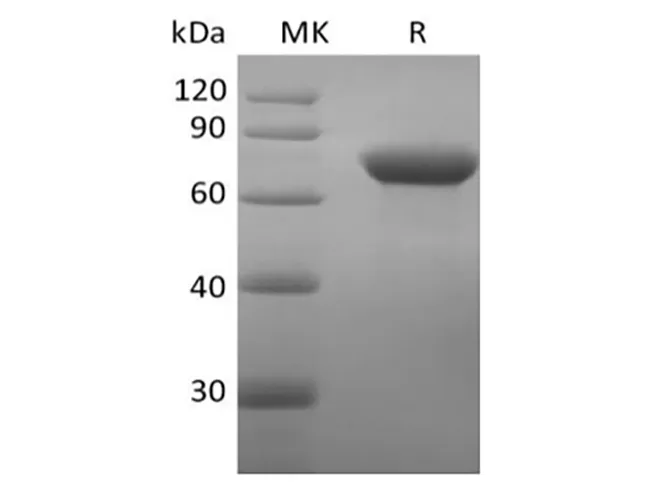Recombinant Human DC-SIGN/CD209 (N-Fc)
CAT:
763-PKSH033989-01
Size:
50 µg
Price:
Ask
- Availability: 24/48H Stock Items & 2 to 6 Weeks non Stock Items.
- Dry Ice Shipment: No




Recombinant Human DC-SIGN/CD209 (N-Fc)
- Background: CD209 is also known as CLEC4L, DC-SIGN and CD209 antigen, is a type II transmembrane protein on DCs with a C-type lectin extracellular domain, is capable of binding ICAM-3 on resting T cells in the secondary lymphoid organs, providing the initial contact between these cells during the establishment of cell-mediated immunity. The DC-SIGN/CD209 lectin domain binds mannose oligosaccharides on pathogens including HIV as well as self glycoproteins including ICAMs (2, 4). DC-SIGN/CD209 binds to butyrophilin 2A1 and this interaction can be blocked by HIV pp120. DC-SIGN/CD209 is expressed on dendritic cells (DC) and inflammatory macrophages and contributes to antigen presentation. It is not only a pattern recognition receptor but implicated in immunoregulation of DCs. It has important role in mediating DC adhesion, migration, inflammation, activating primary T cell, triggering immune response and participating in immune escape of pathogens and tumors.
- Abbreviation: DC-SIGN;CD209
- Synonyms: CD209, CD209 Antigen, CD209 molecule, CDSIGNHIV gpl20-binding protein, CLEC4L, DC-SIGN, DC-SIGN1, DCSIGN
- CAS Number: 9000-83-3
- UniProt: Q9NNX6
- Accession Number: Q9NNX6
- Host: HEK293 Cells
- Origin Species: Human
- Tag: N-Fc
- Sequence: Gln59-Ala404
- Field of Research: Signal Transduction;Microbiology;immunology;
- Purity: > 95 % as determined by reducing SDS-PAGE.
- Bioactivity: Not validated for activity
- Reconstitution: Please refer to the printed manual for detailed information.
- Molecular Weight: 75 kDa
- Shipping Conditions: This product is provided as lyophilized powder which is shipped with ice packs.
- Storage Conditions: Generally, lyophilized proteins are stable for up to 12 months when stored at -20 to -80°C. Reconstituted protein solution can be stored at 4-8°C for 2-7 days. Aliquots of reconstituted samples are stable at < -20°C for 3 months.
